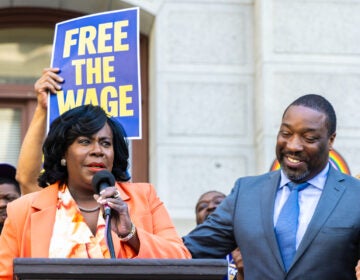Kellogg to hire permanent replacements for striking workers who rejected proposed contract

Kellogg announced plans to permanently replace striking workers who rejected a proposed contract. The walkout started Oct. 5. (Josh Funk/AP)
The Kellogg Company announced Tuesday that a majority of its U.S. workers have voted against a proposed five-year contract, and that the company would hire permanent replacements for the employees who went on strike more than two months ago.
Temporary employees have been working at the company’s cereal plants in Michigan, Nebraska, Pennsylvania and Tennessee.
“After 19 negotiation sessions in 2021, and still no deal reached, we will continue to focus on moving forward to operate our business,” Kellogg North America president Chris Hood said in a statement.
Hood said the company had no choice but to continue executing the next phase of its “contingency plan” — hiring replacement employees.
“While certainly not the result we had hoped for, we must take the necessary steps to ensure business continuity,” Hood said. “We have an obligation to our customers and consumers to continue to provide the cereals that they know and love.”
“Interest in the (permanent replacement) roles has been strong at all four plants, as expected. We expect some of the new hires to start with the company very soon,” Kellogg spokesperson Kris Bahner told Reuters.
The Bakery, Confectionary, Tobacco Workers and Grain Millers International Union, the union representing the 1,400 striking employees, said in a statement Tuesday they will continue to provide “full support to our striking Kellogg’s members.”
“The BCTGM is grateful for the outpouring of fraternal support we received from across the labor movement for our striking members at Kellogg’s. Solidarity is critical to this fight,” the union said Tuesday.
Kellogg workers walked off the job on Oct. 5 at four plants in Battle Creek, Mich.; Lancaster, Penn.; Memphis, Tenn. and Omaha, Neb. after the company and the union were unable to reach an agreement on the terms of a new contract after the previous one expired.
According to the union, Kellogg threatened to send jobs to Mexico, but in an Oct. 12 presentation update, company officials denied that claim.
Kellogg also has a two-tiered wage system, which some companies argue helps them save money. In the tentative five-year agreement announced last week, the changes would include a 3% wage hike for long-time legacy employees as well as increases for both newer, “transitional” workers and new hires based on years of service.
Union members say the proposed two-tiered wage system will take away power from the union by removing the limit on the number of lower-tiered employees, Reuters reported.
The ongoing strike at Kellogg is one of many labor actions that have taken place in the U.S. this year. Employees everywhere from John Deere to Frito-Lay to McDonald’s have all walked off the job so far this year.
9(MDAzMzI1ODY3MDEyMzkzOTE3NjIxNDg3MQ001))




